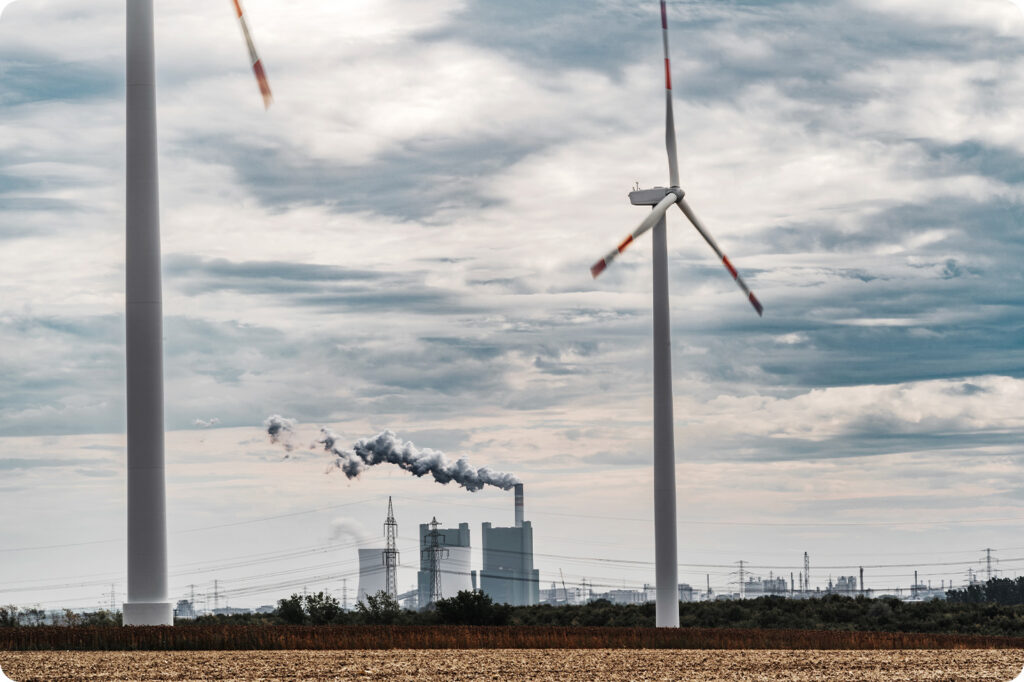The top five climate risk and disclosure stories this week.
Want access to deeper insights and curated climate news? Request a demo of our solution today.
Biden’s EPA issues rule to cut power plant emissions

The US Environmental Protection Agency (EPA) has proposed new carbon pollution standards for coal and natural gas-fired power plants that aim to avoid up to 617 million metric tons of carbon dioxide through 2042.
The proposal introduces new guidelines for limiting greenhouse gas (GHG) emissions from fossil fuel-fired steam generating units as well as tougher standards for newly built generating facilities. Meeting these rules and standards would require operators to use fledgling carbon capture and hydrogen fuel technologies to tramp down their emissions.
The EPA standards are intended to advance President Biden’s climate policy, which aims to reduce US emissions by 50% to 52% below 2005 level by 2030.
“EPA’s proposal relies on proven, readily available technologies to limit carbon pollution and seizes the momentum already underway in the power sector to move toward a cleaner future,” said EPA Administrator Michael S. Regan. “Alongside historic investment taking place across America in clean energy manufacturing and deployment, these proposals will help deliver tremendous benefits to the American people—cutting climate pollution and other harmful pollutants, protecting people’s health, and driving American innovation.”
However, the standards’ impact on US emissions will likely be small. In 2021 alone, the power sector emitted 1.5 billion metric tons of GHG, more than double the 617 million metric tons the standards are projected to reduce over the next two decades.
Most companies lack ambitious decarbonization goals — report

Forty-four percent of publicly traded companies had decarbonization targets in place as of March this year, up from 36% in October 2022, a report out of financial data company MSCI shows.
However these targets vary widely in ambition and scope. Fewer than one in five companies (17%) have targets that align their entire value chains with a 1.5°C warming pathway and less than a third (30%) of all published targets have a net-zero emissions goal.
What is determined to be a “net-zero target” also varies from company to company, with some firms planning to offset their carbon emissions with carbon removals while others are making use of unverified carbon credits. For its analysis, MSCI assessed the climate targets of over 9,000 listed companies in the MSCI All Country World Investable Market Index, which includes firms from every region and economic sector.
MSCI also found that 47% of companies are disclosing direct Scope 1 and/or Scope 2 emissions and 35% are reporting some aspects of their indirect Scope 3 emissions — up four percentage points from October 2022. MSCI said the improvement in disclosure is significant as Scope 3 emissions make up the largest share of most companies’ emissions.
Public companies are projected to exhaust their share of the global emissions budget for limiting temperature rise to 1.5°C by October 2026, MSCI says. On current emissions trends, these companies are on track to heat the planet by 2.7°C this century.
“The equation for investors is that they must address transition risks today or face severe and irreversible physical risks tomorrow, and that they have a role to play in driving the existential change required,” said Sylvain Vanston, a climate change research director at MSCI. “Investors can use their strategic levers, including asset allocation, green investments, and engagement with boards and policymakers, to help not just put companies on a net-zero path, but also encourage the regulatory changes needed to level the business playing field between.”
Oil supermajors’ asset sales don’t reduce emissions — report

Climate disclosure standards are inadequate when it comes to tracking the greenhouse gas (GHG) emissions of major oil companies’ sold assets, a new study shows.
BP, Chevron, ConocoPhillips, and other fossil fuel giants are offloading upstream oil and gas assets to lower their direct emissions in pursuit of their climate goals. The study out of Columbia University and the Sabin Center shows that in many cases these sales result in the transfer of climate-polluting assets to less efficient operators with worse environmental track records, in turn causing overall emissions to rise.
Furthermore, new and emerging climate-related disclosure rules in the European Union, UK, and US have “significant gaps” that make tracking the transfer of specific emissions-intensive assets difficult, the study says. The authors say disclosure rules should be changed to increase transparency on fossil fuel asset sales and reduce the incentives for supermajors to shrink their carbon footprints by offloading emissions-intensive operations.
“Emissions reporting frameworks allow companies to conflate the apparent GHG emissions reductions from asset sales with direct reductions from efficiency improvements and asset retirements,” the study says. “In doing so, they hinder the ability of investors and the public to push for actual emissions reductions. This problem is heightened because, while fossil fuel asset sales may reduce the supermajors’ own emissions, there is little transparency around the post-sale emissions from these assets.”
Republicans question BlackRock’s utilities investments

A group of 17 Republican attorneys general (AGs) has urged the Federal Energy Regulatory Commission (FERC) to review BlackRock’s share holdings in public utilities, claiming the USD$9.1trn asset manager is an “environmental activist.”
US rules prohibit large investors from acquiring more than USD$10m of voting shares in public utilities unless FERC determines that the “transaction is consistent with the public interest in light of competition, rates, and regulation.” BlackRock has a “blanket authorization”, renewable every three years, to exceed the USD$10m threshold on the basis that it is a passive investor.
The Republican AGs, led by Indiana Attorney General Todd Rokita, filed a motion with FERC on Wednesday to end this authorization on the grounds that BlackRock is no longer a passive investor but instead “aims to pressure or force utility companies to phase out traditional energy investment.” The AGs contend that BlackRock’s participation in climate alliances including the Net Zero Asset Managers Initiative and Climate Action 100+ are evidence that it is coordinating with other investors to influence how the utilities operate.
In a statement, BlackRock maintained that it offers clients a range of financial products and proxy voting policies, with a focus on delivering the best financial outcomes for its clients.
FERC, currently split between Democratic and Republican members, is unlikely to act on the AGs’ motion as presented.
Australian regulator cracks down on greenwashing

The Australian Securities and Investments Commission (ASIC) took action to stamp out greenwashing in 35 separate cases from July 1 2022 to March this year.
In a Wednesday report, the watchdog said it addressed potentially misleading disclosures from companies and funds on a range of issues, including net-zero statements and targets, use of the terms “carbon neutral”, “clean”, and “green”, and the scope of investment exclusions and screens.
The report follows a wide-ranging review by ASIC of fund disclosures, fund investment processes, and ESG-related disclosures used by companies to raise capital from retail investors.
“Where we have seen potentially misleading disclosures, we have taken regulatory action,” said ASIC Deputy Chair Karen Chester. “Our interventions range from securing timely corrections, issuing public infringement notices through to commencing civil penalty proceedings.”
ASIC said it is continuing to scrutinize a number of companies suspected of greenwashing and is likely to take further enforcement action in the future.

